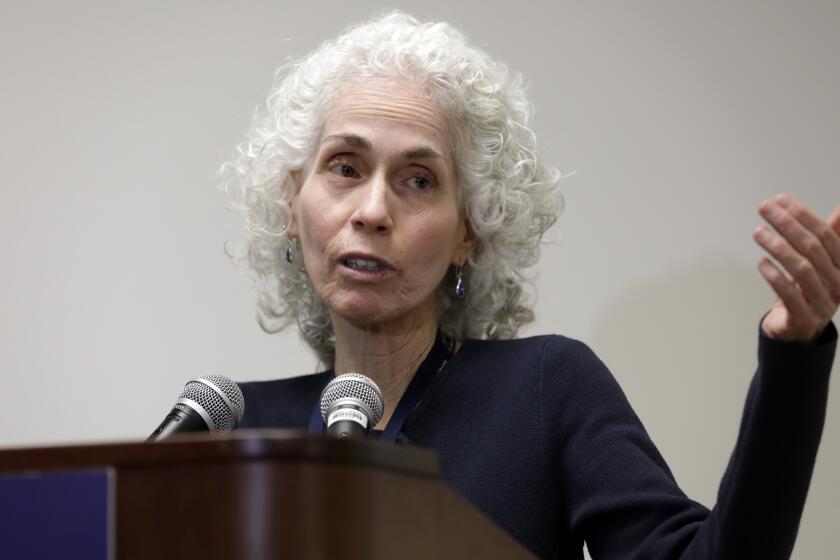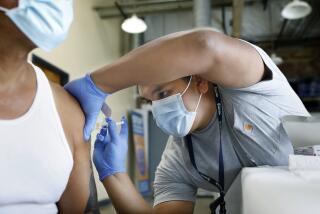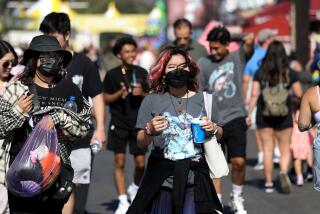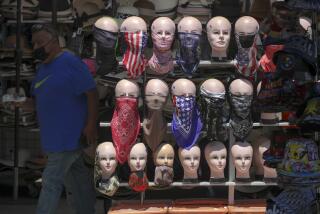Coronavirus-related deaths among L.A. County food processing workers bring dire plea from health officials
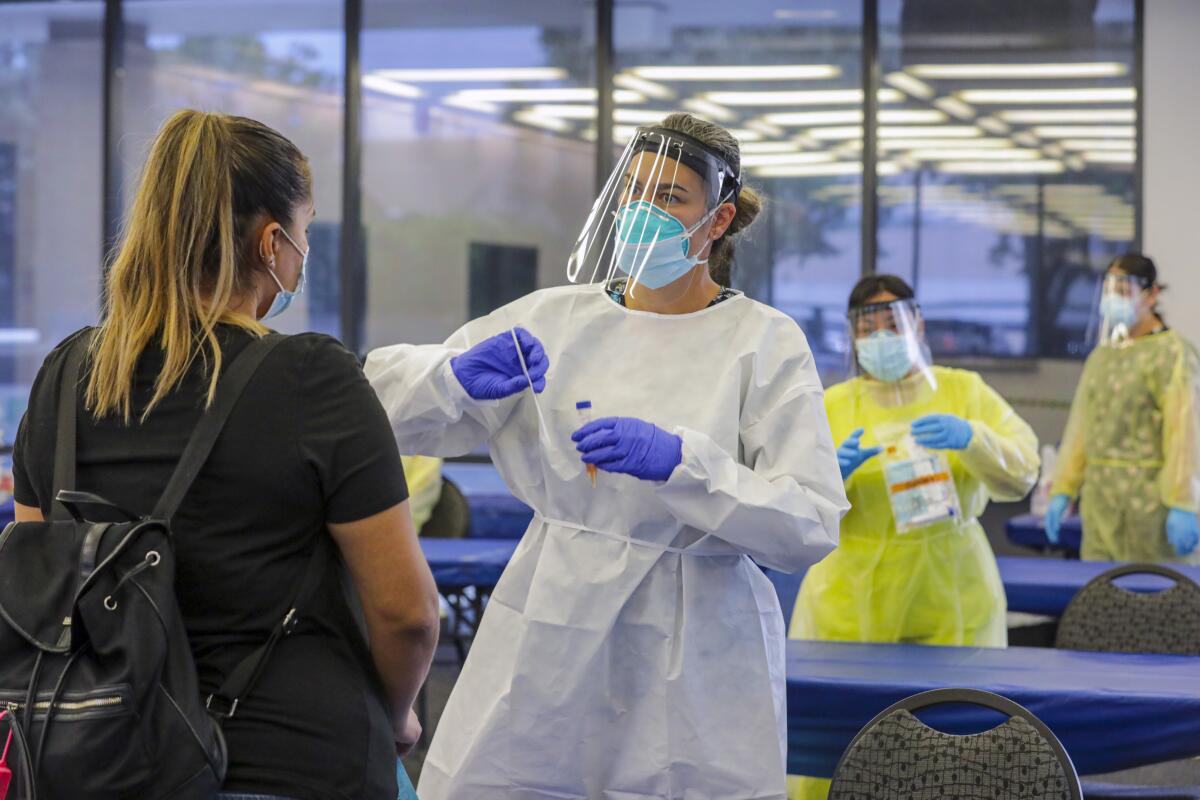
- Share via
With coronavirus deaths now surpassing 9,000 across California, health officials in Los Angeles County are investigating a deadly outbreak at a food processing plant in Commerce and issued another urgent plea for businesses and employees to report COVID-19 cases.
The county is examining the deaths of two employees at Mission Foods Corp. in Commerce.
Mission Foods, a leading distributor of tortillas, chips and salsas sold in grocery stores, was one of three food processing businesses that the county shut down Sunday; as of Thursday, 49 employees have tested positive. All three businesses have since reopened.
L.A. County Health Officer Dr. Muntu Davis said Thursday that the two Mission employees were believed to have had COVID-19 at the time of their deaths.
The latest surge in COVID-19 that hit California more than a month ago as the economy reopened has been tied in part to low-wage employees becoming ill at work and then spreading the virus in their communities. Essential workers — many of them Latino — have been hit hard both in urban areas such as Los Angeles and agricultural hamlets in the Central Valley.
The family of Jose Roberto Alvarez, who oversaw maintenance at Mission Foods and died July 20 after contracting the coronavirus, has criticized the company for failing to disclose to its workers the number of employees who had tested positive.
Alisha Alvarez, the daughter of the 67-year-old deceased worker, said that though her father was notified in May about a positive case, the company did not disclose in the weeks that followed that more workers had gotten sick.
“He didn’t necessarily express too much concern because he didn’t know what was going on behind the scenes and how many cases there were,” she said. “He would say ‘I’m hearing rumblings that so and so has it,’ but nothing official was ever said to him.”
In a statement, Mission Foods said it has focused intensely on worker safety, including temperature checks and other workplace safety measures, informing government officials to COVID-19 cases and giving leaves of absences to workers at high risk.
“During this brief closure period, we worked closely with the Department of Public Health to review and explain our comprehensive COVID-19 protocols and procedures to protect the health and safety of our employees. We also provided all required information about cases among our workforce that we are aware of. The number of reported cases is cumulative since early March. We continue to collaborate on a daily basis with the Los Angeles County Department of Public Health to make sure we are in full compliance with all requirements and safety protocols and to do our part in helping contain the spread of COVID-19 in the community,” the company said in the statement.
During a media briefing Thursday afternoon, Davis stressed the need for businesses to comply with the county’s health orders. That includes reporting any outbreak of three or more cases and alerting all workers who may have been exposed to a person with a known case, he said.
“Businesses have a corporate and moral responsibility to their employees,” Davis said.
The Department of Public Health is investigating more than 1,000 outbreaks of the virus and is receiving 2,000 to 3,000 weekly complaints about businesses. Davis encouraged people to come forward with information about businesses that may be in violation of the health order; complaints to L.A. County can be made by calling (888) 700-9995 and can be done anonymously.
“I encourage all members of the public to report suspected outbreaks,” Davis said. “Actions of individual businesses and communities have an effect on each and every one of us.”
Latinos in California are being infected and dying of the coronavirus at rates significantly higher than white residents. Though Latinos — the state’s largest ethnic group — make up 39% of California’s population, they make up 56% of all coronavirus cases and 46% of deaths. Some of the state’s largest outbreaks have occurred at factories, food processing plants and housing complexes for agricultural workers, both in cities and in agricultural communities.
The disparity is noticeable among Latino residents of all age ranges, including those who are working age.
Of Californians ages 50 to 64, 65% of the coronavirus deaths have occurred among Latinos, even though Latinos make up only 32% of Californians in this age range.
And among Californians ages 35 to 49, Latinos made up 78% of coronavirus-related deaths, even though Latinos in that age range make up just 42% of the population. And for Californian adults under the age of 35, Latinos represent 62% of coronavirus deaths, despite making up 45% of the state’s population in that age group.
L.A. County’s largest outbreak, which infected at least 387 people and resulted in four deaths, forced the temporary closure of the garment factory Los Angeles Apparel, in South L.A.
The other two food processing businesses ordered shut this week were S&S Foods of Azusa, which produces meat and other food products for large-scale food service companies, and Golden State Foods Corp. of Industry, which makes sauces and other condiments for fast-food restaurants including McDonald’s.
S&S Foods now has a total of at least 60 cases and Golden State Foods at least 47, according to the county.
The move comes amid increased enforcement against businesses failing to comply with coronavirus rules.
The companies did not notify the county once they had at least three coronavirus cases, said Barbara Ferrer, L.A. County’s director of public health, and the county is asking for better infection control protocols at all three sites.
Food processing facilities and sites that house farmworkers have been a significant contributor to California’s coronavirus outbreaks.
In the Central Valley, hundreds of workers have been infected at Ruiz Foods, a frozen-food packager in Tulare County, and Central Valley Meat Co., a meatpacking facility in Kings County.
In Ventura County, hundreds of agricultural workers have tested positive, fueled in part by an outbreak at a housing complex that provides agricultural employers with temporary lodging for their workers.
Outbreaks are also a problem across the agricultural heart of California: the Imperial Valley east of San Diego, the Coachella Valley of Riverside County, the Salinas Valley; and the wine country in Sonoma, Napa, Solano, Mendocino and Lake counties.
New coronavirus deaths have increased significantly in the eight-county San Joaquin Valley, a part of the Central Valley that has been hit hard in recent weeks and which has a higher percentage of Latino residents than statewide. For the seven-day period that ended Wednesday, 142 COVID-19 deaths were reported; that’s much worse than the comparable period spanning Memorial Day, when 32 deaths were tallied.
Davis, the L.A. County health officer, also implored places of worship to host only outdoor services and refrain from holding indoor events, a restriction ordered by Gov. Gavin Newsom on July 13 in the hardest-hit counties, including L.A. County.
“Unfortunately, we’ve heard reports of some faith organizations operating outside of those health and safety requirements,” Davis said.
L.A. County has tallied at least 4,559 COVID-19 deaths, and in the last week has averaged about 42 new deaths every day.
Times staff writers Jaclyn Cosgrove, Maya Lau and Iris Lee contributed to this report.
More to Read
Sign up for Essential California
The most important California stories and recommendations in your inbox every morning.
You may occasionally receive promotional content from the Los Angeles Times.
